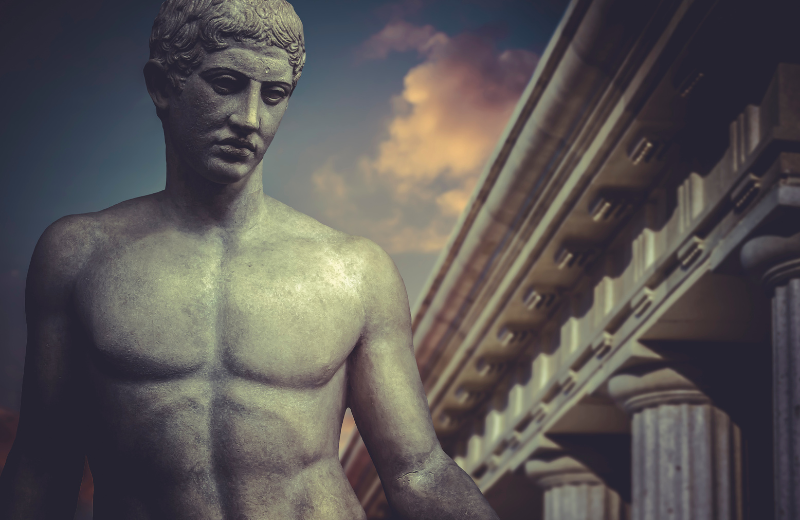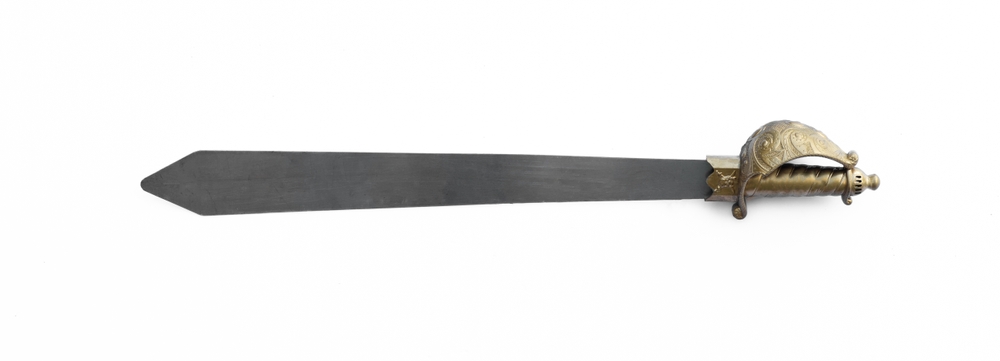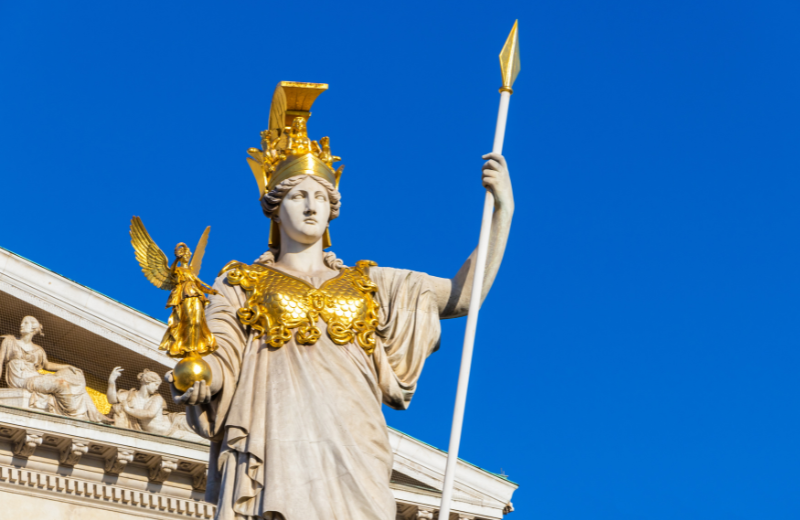In Greek mythology, Orestes is a fascinating figure with a complex and tragic story that has captivated audiences for centuries. As the son of Agamemnon, the great king of Mycenae, and Clytemnestra, his life was shaped by turmoil, revenge, and the weight of family legacy. This blog post shares the myths surrounding Orestes, his relationships, powers, and the timeless moral dilemmas his story presents.
Jump to:
- What Is Orestes in Greek Mythology?
- Who Is Orestes the God of?
- The Myths and Legends of Orestes
- What Powers Does Orestes Have?
- The Symbols of Orestes
- Athena and the Trial of Orestes
- Orestes’s Relationships, Children, and Family Tree
- Orestes’s Worship and Legacy
- Frequently Asked Questions About Orestes
- Study Greek Mythology for £29
Recommended for you!
Best SellersWhat Is Orestes in Greek Mythology?
Orestes is a central character in Greek mythology, known primarily for avenging his father's murder. Agamemnon, his father, was killed by his mother, Clytemnestra, and her lover Aegisthus, leading Orestes into a cycle of revenge and justice. The story of Orestes touches on themes of duty, morality, and divine intervention, as the young prince wrestles with his desire for revenge against the heavy price of committing such an act. His tale is often explored in famous Greek tragedies, especially by playwrights like Euripides and Aeschylus.
Who Is Orestes the God of?
While Orestes isn’t a god, his character holds significant mythological importance. Unlike gods who embody specific virtues or vices, Orestes is human, making him more relatable and impactful for ancient audiences. His story represents the trials of human morality, familial loyalty, and justice. Orestes’s experiences highlight the power of destiny and the difficulty of breaking free from familial cycles of violence—a struggle relatable to many across history.
The Myths and Legends of Orestes

The myths and legends surrounding Orestes are filled with complex moral dilemmas and deep emotional struggles, making him one of the most compelling figures in Greek mythology.
The Crime of Orestes
The primary myth involving Orestes centres on the crime of matricide—killing his mother, Clytemnestra. After Agamemnon was murdered, Orestes returned to Mycenae, guided by his sister Electra and driven by the Olympian god Apollo's urging to avenge his father. However, in ancient Greece, killing one's mother was one of the gravest sins, attracting the wrath of the Furies, also known as the Erinyes, deities of vengeance.
Orestes and the Furies
After murdering Clytemnestra, Orestes was pursued by the Furies, spirits of retribution who sought justice for his crime. His story highlights a deep moral dilemma—his duty to avenge his father conflicted with the monstrous act of killing his mother. His torment represents the ancient Greek belief in divine retribution and the inevitability of punishment for transgressing sacred laws, even when motivated by familial loyalty.
Orestes and Pylades
Throughout his trials, Orestes was accompanied by his loyal friend Pylades. Their friendship is legendary in Greek mythology, symbolising true loyalty and companionship. In some interpretations, their bond is suggested to be deeper than friendship, indicating a close, possibly romantic connection. This relationship underlines themes of unwavering support and love, even amidst despair.
What Powers Does Orestes Have?
Although Orestes did not possess god-like supernatural powers, his “powers” are more symbolic. His strength lay in his determination, sense of justice, and unyielding loyalty to his family’s honour. Apollo, the god of prophecy and healing, guided and protected him throughout his trials, serving as a divine force that offered protection from the Furies and a reminder of his duty. Apollo’s intervention also points to a divine justification for Orestes's actions, although the moral cost was considerable.
The Symbols of Orestes

The symbols in Orestes's story are rich with meaning, reflecting the complex forces that shaped his life and the harsh justice of the ancient world.
The Sword of Vengeance
The sword is a powerful symbol in Orestes's tale. It represents the weight of duty, retribution, and the physical act of avenging his father’s murder. Unlike the divine symbols of gods, Orestes’s sword is an earthly tool, symbolising human agency and the sacrifices made to uphold family honour.
The Furies
The Furies themselves are significant symbols in Orestes’s story. As personifications of guilt and vengeance, they represent the consequence of sin and the relentless pursuit of justice in Greek culture. Their torment of Orestes highlights the moral tension of his story, symbolising the inescapable nature of divine law.
Athena and the Trial of Orestes

Athena, goddess of wisdom, plays a pivotal role in the resolution of Orestes’s story. She intervenes in his trial, ultimately deciding in his favour and bringing an end to the Furies’ pursuit. This moment symbolises the shift from ancient retributive justice to a more balanced, rational system, embodying Athena’s qualities of wisdom and fairness. In this way, Athena’s involvement elevates Orestes’s story from one of vengeance to a broader commentary on justice and morality.
Orestes’s Relationships, Children, and Family Tree
Orestes’s life was profoundly shaped by the relationships within his tragic family tree, each connection bringing new complexities and obligations.
- Agamemnon: Orestes’s father, the king of Mycenae, who led Greek forces in the Trojan War. Agamemnon was killed by his wife, Clytemnestra, upon his return from Troy after he sacrificed their daughter, Iphigenia, to appease the goddess Artemis.
- Clytemnestra: Orestes’s mother, who murdered Agamemnon as revenge for Iphigenia’s sacrifice. Her actions ignited a cycle of vengeance that would drive Orestes to commit matricide.
- Iphigenia: Orestes’s sister, sacrificed by Agamemnon before the Trojan War, which deeply affected their family’s destiny. In some myths, she is later saved by the goddess Artemis and becomes a priestess.
- Electra: Orestes’s devoted sister, who encouraged and supported his mission to avenge their father’s death by killing Clytemnestra. Her loyalty to Orestes highlights the strength of sibling bonds in Greek mythology.
- Pylades: Orestes’s closest friend and companion throughout his trials, known for his unwavering loyalty. Their friendship is legendary, with some interpretations suggesting a deeper, possibly romantic connection.
- Hermione: Daughter of Helen of Troy and Menelaus, she becomes Orestes’s wife in some versions of the myth. Their marriage symbolises an attempt to restore peace and order within their troubled family lineage.
Orestes’s Worship and Legacy
Although not widely worshipped like the gods, Orestes was honoured as a hero, and his tale resonated with ancient audiences for its exploration of justice, vengeance, and the consequences of moral choices. His story held a special place in Athenian theatre, where playwrights like Euripides depicted his struggles, raising questions about human morality, divine justice, and the cost of loyalty.
Recommended for you!
Best SellersFrequently Asked Questions About Orestes
What is the tragic flaw of Orestes?
Orestes’s tragic flaw lies in his unwavering loyalty to family honour. This loyalty pushes him to act on Apollo’s command to kill his mother, a decision that causes unending suffering.
What is the meaning of the name Orestes?
The name "Orestes" is derived from the Greek word orestis, meaning “mountain dweller” or “man of the mountains.” This reflects a common ancient Greek tradition of naming individuals after geographical features, though there is no clear connection between the meaning of his name and his myth.
Is Orestes’s story considered a tragedy?
Orestes’s story is often classified as a tragedy, especially in ancient Greek plays. His life is marked by suffering, moral conflict, and loss, as well as the enduring consequences of his actions, all of which are hallmarks of Greek tragedy.
Were Orestes and Pylades lovers?
While ancient sources depict Orestes and Pylades as having an unbreakable bond, interpretations of their relationship as romantic are largely modern. Their relationship symbolises loyalty, friendship, and support in times of hardship, which can be seen as embodying ideals of love, whether platonic or otherwise.
Study Greek Mythology for £29
Orestes’s story addresses universal themes of power, revenge, and tragedy. If you’d like to learn more about these myths and explore the characters, symbols, and stories that have shaped Western culture, consider enrolling in the Greek Mythology Diploma Course with Centre of Excellence. For a limited time, you can access the course at a discounted price of £29!












